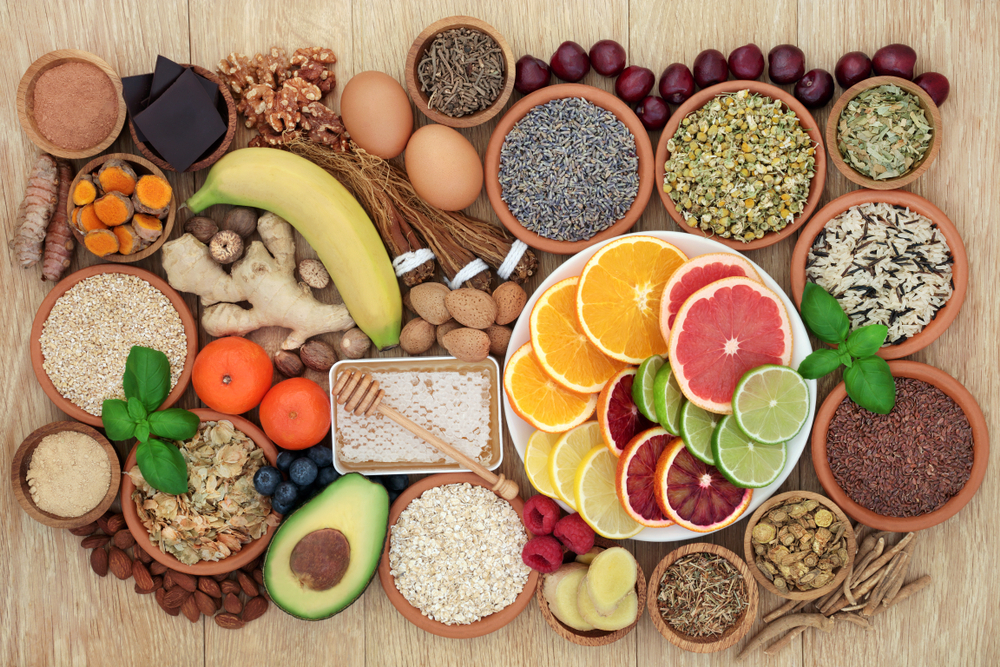Meditation and Nutrition: A Holistic Approach to Daily Life

Table of Contents
In today’s fast-paced world, the combination of meditation and nutrition has become a beacon of light for those seeking a balanced and holistic approach to daily life. This unique blend of mindful practice and nourishing food choices offers a pathway to physical, mental, and emotional well-being. Let’s delve into the intertwining realms of meditation and nutrition, exploring how these practices can harmonize to create a more fulfilling and healthful lifestyle.
Understanding Meditation and Its Benefits
In the buzz of our everyday lives, finding a quiet moment to focus on ourselves can seem like a rare treat. Meditation is one such retreat for the mind where the chatter slows down, and clarity takes the stage. It’s more than just sitting still; it’s about connecting with the quiet within and allowing the mind to rest. As we delve into the world of meditation, we’ll uncover the impressive ways it can clear the fog in our minds, paving the way for inner peace and serenity that’s often lost in our daily rush.
The Influence of Meditation on Mental Clarity
Have you ever felt like your mind is a snow globe that’s been shaken too hard? Meditation is like letting that snow settle so you can see clearly. It’s a simple yet powerful tool that cuts through the fog of everyday distractions. By focusing on your breath or a mantra, you’re training your brain to zoom in on the present moment. As you get better at this, it’s like upgrading to high-definition for your brain; thoughts become more focused and you’re not easily rattled by what’s going on around you.
Imagine sitting down to study, and instead of your thoughts ping-ponging all over the place, they line up neatly like books on a shelf. This isn’t just a nice idea, it’s what can happen with regular meditation. Research shows that people who meditate have more gray matter in regions of the brain linked to attention and sensory processing. It’s a mental workout that strengthens your ability to dodge distractions and zero in on what matters. By giving your mind this kind of space, you’re setting yourself up for clearer thinking and better concentration.
Connecting with Inner Peace and Serenity
Discovering a sense of inner peace and serenity is like uncovering a hidden treasure within ourselves. Meditation is the key that unlocks this treasure chest. It allows us to dive deep into the calm waters of our minds, away from the constant chatter and noise of our everyday lives. When we meditate, we give ourselves the chance to breathe, to reset, and to align with a quieter, more peaceful state of being.
It’s not just about sitting still with closed eyes; it’s an experience where we get to know our true selves, beyond all the roles and responsibilities. In these moments of stillness, serenity wraps around us like a warm, comforting blanket. Inner peace becomes more than just a concept—it becomes our reality, something we carry with us long after our meditation session ends.
The Impact of Nutrition on Mind-Body Wellness

In the dance of life, the food we eat is more than just fuel—it’s the very rhythm that shapes our physical and mental states. Picture your body like a garden; what you put into it can either help it flourish or hold it back. Good nutrition is key to a sharp brain and a resilient body, making every meal a chance to feed your potential. Embark on this exploration of how the nutrients we consume can boost brainpower and foster emotional stability.
Nutrient-Dense Foods and Cognitive Function
Imagine your brain is like a high-powered sports car. Just like that car needs premium fuel to run at its best, our brains need the right kind of nourishment to function optimally. This is where nutrient-dense foods come into play, acting like super gasoline for our mental engine!
Foods that are rich in vitamins, minerals, and antioxidants are like the all-stars of our diet. They do more than just energize us; they help sharpen our focus and keep our memory in top shape. For instance, leafy greens like spinach and kale are packed with vitamin K, which has been linked to better cognitive function. Berries, too, are excellent because they’re full of flavonoids—a group of compounds that can boost memory and even slow down the brain’s aging process.
The Gut-Brain Connection and Emotional Balance
Did you know that what you eat can actually affect how you feel? It’s true! There’s a super-highway between your gut and your brain known as the gut-brain axis. This connection is like a two-way street, sending signals back and forth all day long. When your gut is filled with healthy food, it’s like smooth sailing – your mood can improve and stress might feel easier to handle.
On the flip side, filling up on junk food can lead to traffic jams on this highway. It’s not just a bellyache; it can actually make you feel down or anxious. Experts believe it’s partly because your gut is home to a ton of good bacteria that help make mood-regulating chemicals like serotonin. So, choosing nutrient-dense foods isn’t just great for your body, but it can also bring more emotional balance to your life.
Synergies Between Meditation and Nutrition

When you pair the calming effects of meditation with the right fuel from nutritious foods, something pretty special happens. It’s like two close friends who bring out the best in each other, creating a perfect harmony that boosts our overall well-being. This partnership can turn everyday routines, like eating, into opportunities for mindfulness and self-care, enhancing the benefits we get from both practices. Let’s explore how syncing our mindset with our meals can lead to a smoother, more balanced journey through life.
Mindful Eating as a Meditative Practice
Imagine sitting down to a meal, slowing down, and really savoring every bite. This is the essence of mindful eating—a practice where you pay full attention to the experience of eating. It’s about noticing the colors, textures, flavors, and aromas of your food. By doing this, you turn a regular meal into a moment of meditation. It’s not just about eating slowly; it’s about being fully present with each spoonful.
When you eat mindfully, you’re not just feeding your body; you’re also nourishing your mind. Every bite becomes an opportunity to cultivate gratitude and awareness. You start to recognize true hunger from emotional cravings, and over time, this can lead to healthier eating habits. Plus, it’s a chance to disconnect from the hustle and bustle and connect with the simple joy of nourishment. It’s a holistic practice that can transform an ordinary routine into an extraordinary pause in your day to refresh and recharge.
Using Nutrition to Enhance the Meditation Experience
Did you know the foods you eat can actually change the way you meditate? It’s true! Eating certain types of foods can help to quiet your mind, making it easier to reach that serene state we all seek in meditation. For example, consuming omega-3 fatty acids, found in fish and flaxseeds, can boost brain function and possibly make your meditation sessions more productive.
Focusing on a diet rich in whole, unprocessed foods is another way to support your meditation. Fresh fruits and vegetables are packed with nutrients that can help improve focus and reduce anxiety, allowing for a deeper connection during your meditation practice. When your body feels good from these nutritious foods, your mind is free to explore and expand without being bogged down by discomfort or sluggishness. Remember, a well-nourished body paves the way for a clear, well-nourished mind.
Practical Tips for Incorporating Meditation and Nutrition into Daily Life

Incorporating mindful practices and nutritious eating into our routines can sometimes seem challenging given our hectic schedules. However, with a few practical strategies, aligning your day-to-day activities with a focus on inner calmness and bodily health becomes not only possible but enjoyable. Let’s explore some tips that can help you weave these healthful habits seamlessly into the rhythm of your life.
Creating Mindful Mealtime Rituals
Taking the time to create rituals around your meals can transform eating into a form of meditation. Mindful mealtime rituals involve being fully present with your food, from preparation to consumption. Start by focusing on the colors, textures, and smells of your ingredients. Respect the journey that the food has taken from the earth to your plate, acknowledging the effort and resources that have gone into its production.
During the meal, sit down without distractions like TV or smartphones. Chew slowly, savor each bite, and truly taste the flavors. It’s not just about eating healthily, but also about enjoying the experience of nourishment. This practice allows the mind to settle, brings gratitude for the meal, and can lead to better digestion and satisfaction with smaller portions.
Integrating Breathing Exercises with Nutrient-rich Meal Preparations
Imagine combining the calmness of deep breaths with the sizzle of a nutritious stir-fry on the stove. This is what happens when you mix breathing exercises with meal prep. Taking a moment to focus on your breath can set a relaxed and attentive tone for cooking. Deep breathing can help you tune into the sensory experiences of meal preparation, from chopping crisp vegetables to smelling fresh herbs.
As you inhale and exhale slowly, it’s like hitting the pause button on the day’s craziness. This mindful approach can influence you to make healthier food choices, knowing each ingredient contributes to your well-being. Plus, when you’re relaxed and breathing deeply, your body can digest the goodness of a nutrient-rich meal even better. It’s about creating an atmosphere where eating isn’t just a routine, it’s a nourishing experience for both the mind and body.
The Role of Meditation and Nutrition in Stress Management

Modern life often throws a curveball of stress our way, and learning how to dodge or catch it can make all the difference. Imagine having tools that not only help you face stress head-on but also strengthen your resilience against future stressors. That’s exactly where the dynamic duo of mindful meditation and thoughtful eating habits step in. These practices serve as your personal stress-busting superheroes, each bringing unique powers to the table to help maintain your inner calm and fortify your mental and physical well-being.
Stress Reduction through Nutritional Choices
Eating right isn’t just about keeping your body fit; it can also be a powerful ally in managing stress. Just like a car needs the right fuel to run smoothly, our brains require the right nutrients to handle life’s pressures effectively. Choosing foods high in vitamins and minerals, like the stress-busting B vitamins found in leafy greens, can give our bodies a fighting chance against daily stressors.
Did you know omega-3 fatty acids, found in fish like salmon, can help keep stress hormones, such as cortisol and adrenaline, in check? Incorporating these foods into your diet can help pave the way for a more serene state of mind. By mindfully selecting what we eat, we provide our mental state with a solid foundation to take on whatever comes our way with a calm and centered approach.
Mindfulness Meditation for Stress Relief
Have you ever felt like your brain is in a never-ending race, running circles around stretches of worry and streets of stress? Well, you’re not alone. Mindfulness meditation is like a serene pit stop in the middle of life’s Grand Prix, offering a moment of calm and clarity in the commotion. It’s about being present, letting go of the stressors of the past and the uncertainties of the future, and just embracing the here and now.
Taking a few minutes to sit quietly and focus on your breathing can sound simple, but it packs a punch against stress. As you inhale and exhale, each breath acts like a gentle wave washing over the mind, clearing away tension and creating space for relaxation. This practice is a powerful tool that helps to lower stress levels, reduce anxiety, and lead to better emotional balance, transforming a hectic day into a more peaceful one.
Embracing a Holistic Lifestyle

Finding balance in life sometimes feels like trying to stand still on a tightrope, but embracing a holistic approach can steady our steps. It’s all about syncing our body, mind, and spirit, creating a flow that guides our daily choices and activities. By focusing on the unity of our physical health, mental peace, and emotional vibrancy, we thrive as complete beings. This lifestyle doesn’t happen overnight, but with conscious effort, it can lead us to a place of deep fulfillment and inner harmony.
Finding Balance in Body, Mind, and Spirit
A life well-lived is all about balance. It’s like standing on a surfboard; you have to stay centered to ride the waves without falling. The same goes for juggling the needs of your body, the whispers of your mind, and the essence of your spirit. When these three elements are cared for equally, you’re more likely to brush off stress like dust on your shoulder and tackle challenges with a clear head.
Imagine your body as a garden. It needs the right mix of sunlight, water, and nutrients to flourish—this is where mindful eating habits come into play. But, don’t forget the seeds of positivity and calm that you plant through daily meditation; they’re vital for a peaceful mind and a joyful spirit. By nurturing all aspects of yourself, you create an inner harmony that echoes into every corner of your life, allowing you to live fully and with purpose.
Nourishing the Self with Conscious Choices
Every day, we make countless choices—what to eat, when to rest, and how to spend our time. Yet, when we consciously make these decisions with our health and well-being in mind, we’re not just feeding our bodies; we’re nourishing our whole self. Making conscious choices starts with tuning into our needs and acknowledging that what we consume and how we live profoundly affects both our physical and mental states.
Imagine treating your body like a garden; it flourishes when given the right nutrients and care. Opting for fresh fruits and veggies, whole grains, and lean proteins is like planting the best seeds. Pair that with the enriched soil of regular meditation to help clear the mind, and you’re on your way to a thriving existence. By choosing to live this way, we are not just surviving, we are thriving, cultivating a lifestyle that benefits every facet of our being.
Conclusion
Meditation and nutrition, when woven together, form a tapestry of wellness that extends to every aspect of daily life. By practicing mindfulness in both the food we consume and the thoughts we cultivate, individuals can embark on a transformative journey toward holistic health. Embracing this holistic approach empowers individuals to lead more vibrant, balanced, and fulfilling lives while nurturing a deep sense of harmony within themselves and the world around them.
FAQs
Q: What is the holistic approach to nutrition?
The holistic approach to nutrition considers the entire person—body, mind, and spirit—rather than focusing solely on isolated aspects of diet. It emphasizes the interconnectedness of various factors such as lifestyle, emotions, and environmental influences to promote overall well-being.
Q: What is the holistic approach to meditation?
The holistic approach to meditation involves more than just sitting in silence; it encompasses a broader perspective that integrates mind, body, and spirit. This approach emphasizes mindfulness, self-awareness, and the connection between mental and physical health to achieve a balanced and harmonious state.
Q: What is the holistic approach to life and health?
The holistic approach to life and health considers the individual as a whole, recognizing the interconnectedness of physical, mental, emotional, and spiritual aspects. It involves adopting lifestyle practices that promote balance, mindfulness, and a sense of well-being across various dimensions of life.
Q: What is a holistic nutritionist?
A holistic nutritionist is a professional who approaches nutrition from a holistic perspective, considering the individual’s entire lifestyle, emotional well-being, and physical health. They focus on personalized and integrative approaches to nutrition to promote overall wellness.
Q: What are the 7 holistic approaches?
The 7 holistic approaches typically include addressing physical, emotional, mental, social, environmental, spiritual, and cultural aspects of an individual’s life. These interconnected dimensions are considered to be integral to achieving overall well-being and balance.
Q: How do you take a holistic approach to life?
Taking a holistic approach to life involves considering and nurturing various aspects of your well-being. This includes maintaining a healthy lifestyle, fostering positive relationships, managing stress, practicing mindfulness, connecting with nature, and addressing emotional and spiritual needs. It’s about recognizing the interplay between different dimensions of life for overall balance and harmony.
Useful resources
- Harvard Health Publishing: Meditation and Stress Reduction: This article from Harvard University delves into the scientific evidence linking meditation to stress reduction and its positive impact on both physical and mental health. It also offers practical tips for beginners to get started with meditation.
https://www.health.harvard.edu/mind-and-mood/meditation-for-your-health
- Mindful: Eating with Awareness: This website from the mindful.org project explores the concept of mindful eating, explaining how it can help us cultivate a healthier relationship with food and improve our overall well-being. The article offers exercises and practical tips for mindful eating practices.
https://foodandnutrition.org/blogs/stone-soup/6-strategies-mindful-eating/
- Chopra Center: Yoga and Your Diet: This resource from the Chopra Center explores the connection between yoga and diet, emphasizing the importance of nourishing both the body and mind for optimal health. It offers specific dietary recommendations based on Ayurvedic principles.
- Greater Good Science Center: The Food-Mood Connection: This article from the Greater Good Science Center at UC Berkeley explains the scientific evidence behind the connection between what we eat and our mood and mental well-being. It offers guidance on how to use dietary strategies to support emotional health and resilience.
https://www.psychreg.org/connection-between-food-and-mood/








you are in reality a good webmaster The website loading velocity is amazing It sort of feels that youre doing any distinctive trick Also The contents are masterwork you have done a fantastic job in this topic
Normally I do not read article on blogs however I would like to say that this writeup very forced me to try and do so Your writing style has been amazed me Thanks quite great post
Thanks for sharing. I read many of your blog posts, cool, your blog is very good.
You’re welcome, I’m thrilled to hear you’ve been enjoying my blog posts, and thank you for the kind words!
Your point of view caught my eye and was very interesting. Thanks. I have a question for you.
Great information shared.. really enjoyed reading this post thank you author for sharing this post .. appreciated